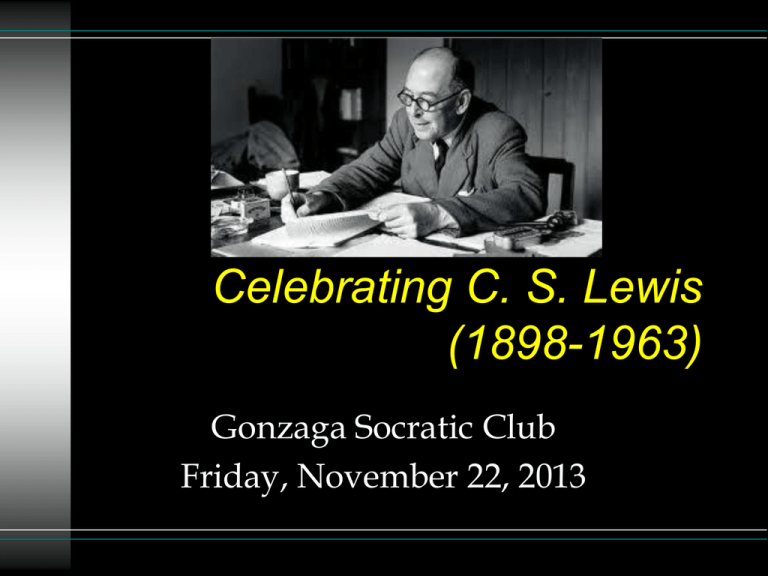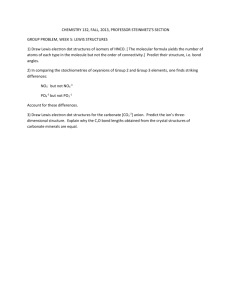Remembering CS Lewis
advertisement

Celebrating C. S. Lewis (1898-1963) Gonzaga Socratic Club Friday, November 22, 2013 Remembering C. S. Lewis Lewis was born 115 years ago, but today we celebrate the 50-year anniversary of his death in 1963 In doing so, we join celebrations across the globe, including his home academic universities of Oxford and Cambridge, Christian universities such as Baylor, and multiple news sites such as PBS, The Guardian, and USA today Westminster Abbey Memorial Remembering C. S. Lewis Lewis is perhaps best known by the general public for his Narnia series, and therefore as a Christian author Several generations of Christians appreciate Lewis as an apologist, author of books such as Mere Christianity and The Problem of Pain, and also a devotional Christian author (The Weight of Glory) He also wrote science fiction (Out of the Silent Planet), adult fiction (Till We Have Faces), literary criticism, and academic literary scholarship Jesus as Moral Teacher? Perhaps best known passage is the “trichotomy” argument from Mere Christianity: “A man who was merely a man and said the sort of things Jesus said would not be a great moral teacher. He would either be a lunatic—on a level with the man who says he is a poached egg—or else he would be the Devil of Hell. You must make your choice. Either this man was, and is, the Son of God: or else a madman or something worse. You can shut Him up for a fool, you can spit at Him and kill Him as a demon; or you can fall at His feet and call Him Lord and God. But let us not come with any patronising nonsense about His being a great human teacher. He has not left that open to us.” Underland in The Silver Chair The enchanted argument of The Lady of the Green Kirtle, the Witch Queen of the Underland, in The Silver Chair: all of our intimations of a world beyond immediate experience are merely imaginary Response of the Marsh-Wiggle Puddleglum is a declaration of the Christian in the post-Christian, scientistic, reductionistic world Puddleglum, The Silver Chair “Suppose we have only dreamed, or made up, all those things—trees and grass and sun and moon and stars and Aslan himself. Suppose we have. Then all I can say is that, in that case, the made-up things seem a good deal more important than the real ones. Suppose this black pit of a kingdom of yours is the only world. Well, it strikes me as a pretty poor one. And that’s a funny thing, when you com e to think of it. We’re just babies making up a game, if you’re right. But four babies playing a game can make a play-world which licks your real world hollow. That’s why I’m going to stand by the play-world. I’m on Aslan’s side even if there isn’t any Aslan to lead it. I’m going to live as like a Narnian as I can even if there isn’t any Narnia.” Fideism vs Enchantment toward Truth Puddleglum—and Lewis—aren’t saying that we should just make up a world and believe in it. Such fideism is deluded and unsustainable We should however be alive to the enchantment of imagination that can awake us to and point us in the direction of Truth The Pilgrim’s Regress Dr Forrest Baird Whitworth University Griffith Park Observatory Palos Verde Peninsula Catalina Island A. Sehnsucht: An experience of “Bitter-sweet Longing” "Though the want is acute and painful, yet the mere wanting is felt to be somehow a delight." A. “Bitter-sweet Longing” Most desires only pleasures if satisfaction is nearby. This desire is better than fulfillment. If the desire is absent, the desire itself may be desired—a new instance of the original desire. B. Mysterious Object of Desire "There is a peculiar mystery about the object of this Desire." B. Mysterious Object of Desire People think they know what the desired object is, but... Every supposed object is inadequate to fulfill the desire. Therefore, the human soul was made to enjoy some object never fully given in subjective and space-time experience. “Siege Perilous” in King Arthur’s castle C. An Argument from Analogy We experience thirst, so we conclude… We are creatures who need water to survive We experience hunger, so we conclude… We are creatures who need food to survive Though there is no guarantee we will get either We experience longing for something not available in our natural world, so we conclude… We are creatures made to experience something super-natural The Voyage of the Dawn Treader Dr Jennifer Mills Communications, Moody Bible Institute, Spokane “Well anyway, I looked up and saw the very last thing I expected: a huge lion coming slowly toward me. And one queer thing was there was no moon last night, but there was moonlight where the lion was. So it came nearer and nearer. I was terribly afraid of it. You may think that, being a dragon, I could have knocked any lion out easily enough. But it wasn’t that kind of fear. I wasn’t afraid of it eating me, I was just afraid of it – if you can understand. Well, it came close up to me and looked straight into my eyes. And I shut my eyes tight. But that wasn’t any good because it told me to follow it.” “You mean it spoke” “I don’t know. Now that you mention it, I don’t think it did. But it told me all the same. And I knew I’d have to do what it told me, so I got up and followed it. And it led me a long way into the mountains. And there was always this moonlight over and round the lion wherever we went. So at last we came to the top of a mountain I’d never seen before and on the top of this mountain there was a garden – trees and fruit and everything. In the middle of it there was a well. “I knew it was a well because you could see the water bubbling up from the bottom of it: but it was a lot bigger than most wells – like a very big, round bath with marble steps going down into it. The water was as clear as anything and I thought if I could get in there and bathe, it would ease the pain in my leg. But the lion told me I must undress first. Mind you, I don’t know if he said any words out loud or not. “I was just going to say that I couldn’t undress because I hadn’t any clothes on when I suddenly thought that dragons are snaky sorts of thing and snakes can cast their skins. Oh, of course, thought I, that’s what the lion means. So I started scratching myself and my scales began coming off all over the place. And then I scratched a little deeper and, instead of just scales coming off here and there, my whole skin started peeling off beautifully, like it does after an illness, or as if I was a banana. In a minute or two I just stepped out of it. I could see it lying there beside me, looking rather nasty. It was a most lovely feeling. So I started to go down into the well for my bathe. “But just as I was going to put my feet into the water I looked down and saw that they were all hard and rough and wrinkled and scaly just as they had been before. Oh, that’s all right, said I, it only means I had another smaller suit on underneath the first one, and I’ll have to get out of it too. So I scratched and tore again and this underskin peeled off beautifully and out I stepped and left it lying beside the other one and went down to the well for my bathe. “Well, exactly the same thing happened again. And I thought to myself, oh dear, how ever many skins have I got to take off? For I was longing to bathe my leg. So I scratched away for the third time and got off a third skin, just like the two others, and stepped out of it. But as soon as I looked at myself in the water I knew it had been no good. “Then the lion said – but I don’t know if it spoke – ‘You will have to let me undress you.’ I was afraid of his claws, I can tell you, but I was pretty nearly desperate now. So I just lay flat down on my back to let him do it. “The very first tear he made was so deep that I thought it had gone right into my heart. And when he began pulling the skin off, it hurt worse than anything I’ve ever felt. The only thing that made me able to bear it was just the pleasure of feeling the stuff peel off. You know – if you’ve ever picked the scab off a sore place. It hurts like billy-oh but it is fun to see it coming away.” “I know exactly what you mean,” said Edmund. “Well, he peeled the beastly stuff right off – just as I thought I’d done it myself the other three times, only they hadn’t hurt – and there it was, lying on the grass, only ever so much thicker, and darker, and more knobbly-looking than the others had been. And there was I as smooth and soft as a peeled switch and smaller than I had been. Then he caught hold of me – I didn’t like that much for I was very tender underneath now that I’d no skin on – and threw me into the water. It smarted like anything but only for a moment. After that it became perfectly delicious and as soon as I started swimming and splashing I found that all the pain had gone from my arm. And then I saw why. I’d turned into a boy again.” The Abolition of Man, Prince Caspian Dana Mannino Gonzaga BA graduate, current graduate student at Dominican University That Hideous Strength Dr Catherine Tkacz Research Associate, Bishop White Seminary at Gonzaga University Lewis’ Space Trilogy Till We Have Faces Dr Brian Clayton Phliosophy, Gonzaga University “…Do you think we mortals will find you gods easier to bear if you’re beautiful? I tell you that if that’s true we’ll find you a thousand times worse. For then (I know what beauty does) you’ll lure and entice. You’ll leave us nothing; nothing that’s worth our keeping or your taking. Those we love best—whoever’s most worth loving—those are the very ones you’ll pick out….It would be far better for us if you were foul and ravening. We’d rather you drank their blood than stole their hearts. We’d rather they were ours and dead than yours and made immortal….The girl was mine. What right had you to steal her away into your dreadful heights? You’ll say I was jealous. Jealous of Psyche? Not while she was mine….That’s why I say it makes no difference whether you’re fair or foul. That there should be gods at all, there’s our misery and bitter wrong. There’s no room for you and us in the same world. You’re a tree in whose shadow we can’t thrive. We want to be our own. I was my own and Psyche was mine and no one else had any right to her. Oh, you’ll say you took her away into bliss and joy such as I could never have given her, and I ought to have been glad of it for her sake. Why? What should I care for some horrible, new happiness which I hadn’t given her and which separated her from me? Do you think I wanted her to be happy that way?...Did you ever remember whose the girls was? She was mine. Mine. Do you not know what the word means? Mine! You’re thieves, seducers….” “Enough,” said the judge. There was utter silence all round me. And now for the first time I knew what I had been doing….Now I knew that I had been reading it over and over—perhaps a dozen times. I would have read it forever,…if the judge had not stopped me. And the voice I read it in was strange to my ears. There was given to me a certainty that this, at last, was my real voice. There was silence in the dark assembly long enough for me to have read my book out yet again. At last the judge spoke. “Are you answered?” he said. “Yes,” said I. The complaint was the answer. To have heard myself making it was to be answered. Lightly men talk of saying what they mean. …When the time comes to you at which you will be forced at last to utter the speech which has lain at the center of your soul for years, which you have, all that time, idiot-like, been saying over and over, you’ll not talk about joy of words. I saw well why the gods do not speak to us openly, nor let us answer. Till that word can be dug out of us, why should they hear the babble that we think we mean? How can they meet us face to face till we have faces? --Till We Have Faces …We have never told the whole truth. We may confess ugly facts—the meanest cowardice or the shabbiest and most prosaic impurity—but the tone is false. The very act of confessing—an infinitesimally hypocritical glance—a dash of humour—all this contrives to dissociate the facts from your very self. No one could guess how familiar and, in a sense, congenial to your soul these things were, how much of a piece with all the rest: down there, in the dreaming inner warmth, they struck no such discordant note, were not nearly so odd and detachable from the rest of you, as they seem when turned into words. --The Problem of Pain, Chapter 4 …But…though Our Lord often speaks of Hell as a sentence inflicted by a tribunal, He also says elsewhere that the judgement consists in the very fact that men prefer darkness to light, and that not He, but His ‘word’, judges men. We are therefore at liberty…to think of this bad man’s perdition not as a sentence imposed on him but as the mere fact of being what he is. The characteristic of lost souls is ‘their rejection of everything that is not simply themselves’. Our imaginary egoist has tried to turn everything he meets into a province or appendage of the self. The taste for the other, that is, the very capacity for enjoying good, is quenched in him except in so far as his body still draws him into some rudimentary contact with an outer world. Death removes this last contact. He has his wish—to lie wholly in the self and to make the best of what he finds there. And what he finds there is Hell. …I willingly believe that the damned are, in one sense, successful, rebels to the end; that the doors of hell are locked on the inside. I do not mean that the ghosts may not wish to come out of hell, in the vague fashion wherein an envious man ‘wishes’ to be happy: but they certainly do not will even the first preliminary stages of that selfabandonment through which alone the soul can reach any good. They enjoy forever the horrible freedom they have demanded, and are therefore self-enslaved: just as the blessed, forever submitting to obedience, become through all eternity more and more free. -- The Problem of Pain, Chapter 8 Celebrating C. S. Lewis (1898-1963) Gonzaga Socratic Club Friday, November 22, 2013

